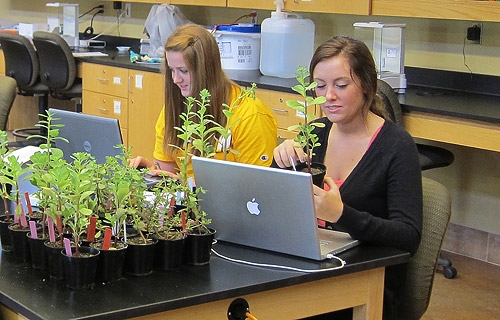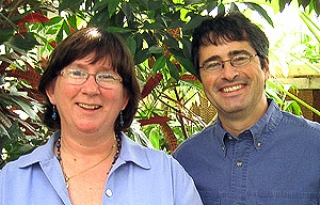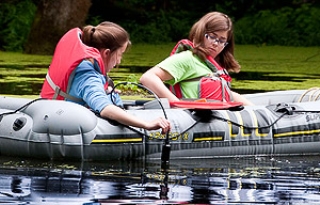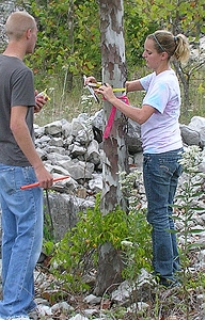Environmental Fellows Program
July 15, 2011

Students will have an exciting opportunity to focus on environmental issues through a newly established four-year program at DePauw that is designed to foster an interdisciplinary understanding of environmental issues. The new Environmental Fellows Program is the fifth Honors and Fellows Program at DePauw.
The Environmental Fellows Program has three main components – coursework with an environmental focus, an internship and senior seminar. Students will choose three classes from the sciences and three from art, humanities or social sciences in addition to the senior seminar.
The internship will enable students to have an extended, intensive research experience. It could be a traditional internship or occur during an off-campus study program – if there is a substantial field or internship component. The goal is to have an experience outside the classroom and out in the world – taking advantage of the opportunity to apply knowledge learned and gaining a better understanding of how it’s integrated.
The other Honors and Fellows Programs include: Honor Scholar Program, Management Fellows, Media Fellows and Science Research Fellows.
James “Jim” H. Benedix, professor of biology, and Michele T. Villinski, associate professor of economics and management, are the Environmental Fellows program co-directors (at right).
“We want to provide an opportunity for students to study environmental issues in an academic, intellectual way,” Villinski says. “This is not an advocacy program. Students don’t need to have a particular attitude about the environment. We want to combine the academic rigor and critical thinking that DePauw promotes and allow, encourage and enable students to apply that to environmental issues.”
Benedix says, “The idea is to give them expertise in the field they want to work in and also connect that field to environmental issues.”
While most of the structure of the program is in place, the program’s steering committee will meet this fall to approve course offerings. This year, the program is accepting lateral-entry applicants – sophomores in the fall and first-year students in spring 2012.
“As part of the Mellon grant proposal, we promised to have conversations and work hard to find a way to institutionalize our curricular offerings as an interdisciplinary program about the environment,” Villinski says. “Getting the grant and funding speakers and co-curricular events really helped us get momentum and gain interest for this program.” In 2010, DePauw received a $595,000 three-year grant from The Andrew W. Mellon Foundation to create new and innovative opportunities related to interdisciplinary environmental education for students and faculty members.
In 2010, DePauw received a $595,000 three-year grant from The Andrew W. Mellon Foundation to create new and innovative opportunities related to interdisciplinary environmental education for students and faculty members.
In addition to helping fund the Environmental Fellows Program, the Mellon grant supports: two faculty members (one recently hired, one new) who will enhance environmental course offerings; research opportunities for students; the development of new courses and the addition of environmental modules to existing courses; a variety of co-curricular activities, including symposia and workshops; and continued support for the DePauw Environmental Policy Project (DEPP).
“We spent a lot of time talking about models for a curricular program,” Villinski says. “We wanted to be sure that the students have both the depth of understanding of a particular area and also the breadth of understanding across the disciplines.
“Once we came to the idea of a fellows program, we got very excited because if a student majors in economics, for example, and is an Environmental Fellow, he or she could still go to graduate school in economics or law school but have this added dimension of an environmental cluster of courses and experiences that will possibly open other doors,” Villinski says.
economics, for example, and is an Environmental Fellow, he or she could still go to graduate school in economics or law school but have this added dimension of an environmental cluster of courses and experiences that will possibly open other doors,” Villinski says.
The grant is helping fund a new tenure-track position in political science. Both Benedix and Villinski agree that this position adds a crucial component to the Environmental Fellows course offerings: environmental policy. “We think this will increase interest and rigor in the program,” Villinski says.
“This is just the beginning,” she says. “We’re excited, energized and motivated about Environmental Fellows, but we also think there is room for environmental minors and possibly majors.”
“Many DePauw students have an emotional connection to the environment and want to change the world, but we want them to be prepared so that they can make a real impact in this area,” Benedix says. “We hope the Environmental Fellows Program will enable them to do that.”
For more information about the Environmental Fellows Program, visit the website by clicking here.